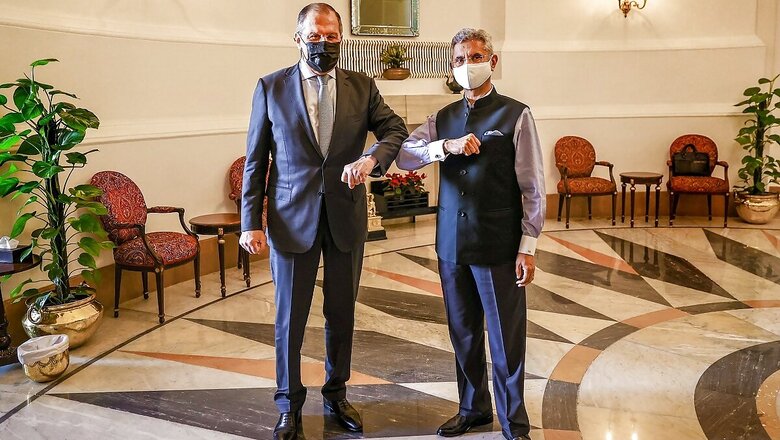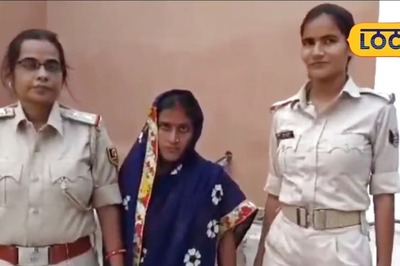
views
Some fog around our ties with Russia needs to be lifted. Differences over some issues, which have surfaced, are real, but they should not be exaggerated. Compared to the differences we have with the United States, those with Russia are much more confined. They are the normal product of dramatic changes in international relations in recent decades to which India and Russia have had to adjust their foreign policies. The important point is that even as both sides have responded in the light of national interests, efforts to preserve the bilateral ties at their core have continued.
Russia is under great pressure by the West. This has pushed it towards China with which it has forged increasingly close strategic ties. We are impacted by this, as this has altered the balance within the Russia-India-China and the BRICS formats against us. So long as the US sees both Russia and China as adversaries and does not try to glean Russia away from China, Russian reliance on China to compensate for combined US/European pressure will not diminish.
The strengthening of Russia-China ties is not directed at India, just as the strengthening of India-US ties is not directed at Russia. How Russia plays its ties with India in the China context would be important to us. With India-China ties deteriorating, it will serve our interests if Russia remains neutral. We would expect this because Russia-China ties are not devoid of elements of conflict and rivalry.
China has replaced Russia as the world’s number two power, encroached into Russia’s space in Central Asia as well as Europe, generated concerns in Russia about its ambitions in the Arctic, seeks revision of the terms of 2001 Treaty of Good Neighbourliness and Friendly Cooperation that Russia is resisting, and so on. The recent China-Iran agreement would not have pleased Russia either because of the feeling that it has done much of the heavy lifting for Iran on the nuclear issue and its regional interests but China is reaping most of the advantage from it. Russia is also aware that notwithstanding the growing tensions in US-China relations, China has more options to deal with the US than Russia has.
China’s ambitions to be at the centre of international relations by 2049, which is effectively a G-2 ambition, will be at the expense of Russia’s global status that its leadership seeks to preserve. In this context, Russia should perhaps be more careful not to allow the China factor to interfere with its India’s ties, as weakening them in any way is to China’s advantage.
Some Wrinkles
We should keep some of these elements in mind while assessing the import of Russian Foreign Minister Sergey Lavrov’s statement to the media during his recent visit to India that Russia’s ties with China are today closer than at any time in history. He merely restated what President Putin has already said in Moscow publicly. That he repeated this on Indian soil at a time when India is a victim of Chinese aggression in eastern Ladakh would have grated on Indian ears no doubt, just as the Indian Foreign Minister telling the press in Moscow after the US announced a new slew of sanctions on Russia that India’s relations with the US were the best they have ever been in history would have raised eyebrows locally. However, this was said to balance the other part of his statement that denied any intention to forge a military alliance with China. While President Putin had left the possibility of an alliance vaguely open, Lavrov was more categorical in ruling it out.
ALSO READ| With Quad Summit, India Plans to Outsmart China at its Own Game
It is regrettable that for the first time after 2000 the annual summit between India and Russia could not take place in 2020. If COVID-19 was the reason for President Putin not being able to come to India in person, a virtual summit could have been held. Why it was not has raised speculation about the state of ties. But the fact remains that Putin has not travelled at all out of Russia after the pandemic struck; now that he has been vaccinated, the prospects of his travelling to India anytime after summer have arisen. The dates have still not been fixed because of the uncertainties around COVID-19. The intention, so far, is for President Putin to make a bilateral visit. India will, however, be hosting the BRICS summit this year and if that goes through it is likely that the bilateral visit will get combined with the BRICS event.
On Afghanistan, the differences in our respective thinking are manifest. Russia looks at the situation from its own perspective in which India’s concerns do not get adequate consideration. India was excluded from the Moscow format because of Pakistan and China, with Russia believing it is not its role to pick up cudgels on India’s behalf with the other two, and no doubt being of the view that India’s presence in this restricted format may hinder progress. That the US has invited India to the conference under the auspices of the UN strikes a contrast. However, to assume that India and Russia are not having separate conversations about the endgame in Afghanistan if the present peace efforts do not fructify would be a mistake. Russia and India have a default position in which Iran is not absent.
The Big Picture
Russia’s developing ties with Pakistan should also be seen in proper perspective, rather than becoming nervous about Russia’s outreach to that country. That Lavrov visited Pakistan after nine years and combined it with his Indian visit should not be given too much importance. Pakistan, of course, has long tried to promote wrinkles in India-Russia ties and elements in Russia have long been unhappy about being excluded from the arms market in Pakistan because of India’s sensitivities. India is seen as becoming too close to the US and this argument is used to justify overtures to Pakistan. We should look at this pragmatically. Russia, we have reason to believe, will not sell lethal military equipment to Pakistan. Lavrov’s reference to selling “relevant military equipment” was in the context of counter-terrorism operations. Russia will not join any CPEC project, as it is responsive to India’s sovereignty argument. The gas line project it is pursuing in Pakistan is outside this framework.
ALSO READ| China is Crossing Limits of Diplomatic Conduct. But It Must Know Notion of Middle Kingdom is Obsolete
On the Indo-Pacific and Quad issues, Russia’s objections, especially opposition to it on China’s behalf, is a difficult issue. The differences in our respective views will remain, particularly as India-China relations are on a downward path; whatever the final outcome in eastern Ladakh, India-US maritime ties will continue to strengthen and Quad will acquire more depth. Lavrov remains reluctant to recognise the term Indo-Pacific and referred to Asia-Pacific in New Delhi, knowing that this term excludes India.
The argument that the Indo-Pacific concept revives block politics ignores China’s unacceptable maritime conduct in the Indo-Pacific, affecting India’s security. India and Russia must therefore develop a minimum understanding on this issue. India has genuine concerns about China’s aggressive conduct towards India bilaterally, regionally and internationally. Russia has genuine grievances about the US policy towards it, but that is not enough reason to underplay India’s concerns about China. In fact, China is threatening Russian power as much as countering that of the US. India has no interest whatever in curbing Russia’s power in the Indo-Pacific. India’s interest in Russia’s Far East and the envisaged Vladivostok-Chennai Corridor recognises Russia’s equities in the Indo-Pacific.
All in all, whatever the creases, it would appear that Russia’s thinking about India is changing, with greater recognition of its rising stature and the need to court it more for forging stronger ties. On defence, Russia is willing to, more than before, participate in joint production ventures, seeing the “atmanirbhar” writing on the wall. In some instances, it is our system that is delaying decisions. India is pushing development cooperation in Russia’s Far East for which it has offered a $1 billion line of credit. In the Arctic area, some new announcements of Indian investments are likely to be made. Russia is keen to participate in railways and inland waterways projects in India. Approval for the Sputnik vaccine to be manufactured for use in India is likely to come soon. President Putin’s visit to India for which preparatory work has begun should set at rest some misgivings and give a further boost to ties that are geopolitically vital for both countries.
Read all the Latest News, Breaking News and Coronavirus News here. Follow us on Facebook, Twitter and Telegram.

















Comments
0 comment